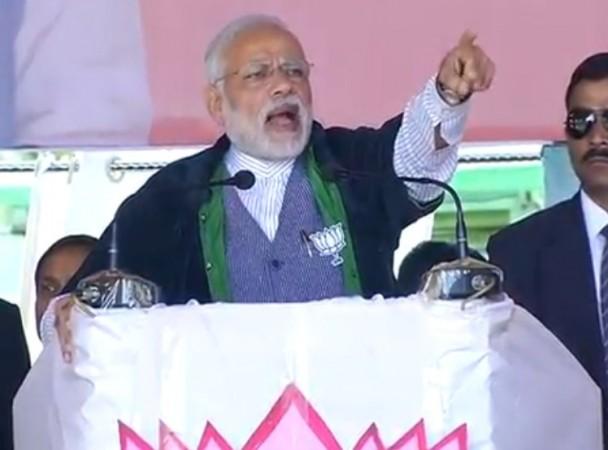
Manipur, which usually makes it to national media only during national or international sports event and violence, has come alive all of a sudden. Thanks to the upcoming state Assembly election that has attracted the attention of the biggest stalwarts in Indian politics, including Prime Minister Narendra Modi, Congress vice-president Rahul Gandhi, Union Home Minister Rajnath Singh and Minister of State for Home Affairs Kiren Rijiju. But they came just for votes and power, and not development -- at least that's what the tone of their double-edged speeches indicated.
For once, listening to the recent speeches of politicians from the Centre and Manipur Chief Minister Okram Ibobi Singh could make many think if the Central government is on the verge of solving the six-decade-old Naga issue as they seemed to be more interested in the peace accord that was signed more than one and a half years ago than the upcoming Assembly elections.
[READ: NSCN-IM: Reason Why Nagas Can't Celebrate Signing of 'Historic Peace Accord']
The Central government had signed a peace accord with the Nationalist Socialist Council of Nagaland (Isak-Muivah) (NSCN-IM) on August 3, 2015, in an attempt to end over six decades of Nagas' struggle for self determination. However, it has become a bone of contention for political parties over the mystery around its content.
Why this sudden love for the "peace accord" by both the politicians in the state and the Centre? It's all politics, something that will die soon after the elections on March 4 and 8.
Ibobi Singh has played "Manipur Integrity" card in the past to achieve his political ambitions and is using the same trick again this time. The only difference this time is that the Central government too has joined the bandwagon.
Ibobi successfully blocked NSCN (I-M) general secretary Thuingaleng Muivah from visiting his native village in 2010. It cost the lives of two young students at Mao Gate (Naga inhabited area), but the incident helped him win the 2012 Assembly elections. When many might have thought he could be running out of ideas this time around, he has picked up the "peace accord" that was signed between the Central government and the NSCN (I-M) in 2015 in a bid to claim the power once again. It is to be seen if he will be second time lucky.
Sadly, leaders at the Centre too have fallen into the pool created by Ibobi for political gain. In his recent visit to Manipur, Rajnath Singh assured the territorial integrity of the state saying that even the name of Manipur is not mentioned in the framework agreement signed between the Centre and the NSCN (I-M). PM Modi reaffirmed the statement at an election rally in the state.
Interestingly, Kiren Rijiju said while campaigning for 44-Chingai AC BJP candidate Sword Vashum in Ukhrul, that the party is determined to solve the Naga political issue at the earliest.
That was not all. Rahul Gandhi's election rally in Imphal on Tuesday too hovered around the Naga Peace Accord. He demanded the Central government to make the content of the agreement public saying that it is not fair to keep the public in the dark.
But why this obsession for the Naga Peace Accord now? It is obvious that all political parties are playing "majority" appeasement politics. The majority community of the state, Meiteis, have 40 seats in the 60-member Assembly, while the hills have 20 seats, out of which only 11 are from Naga-majority region. So, it is safer for all political parties to play with the Naga issue for power.
So much respect for over six decades of Nagas' struggle for self determination.

















